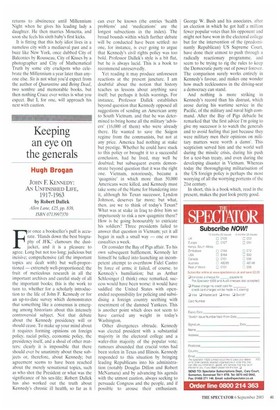Keeping an eye on the generals
Hugh Brogan
JOHN F. KENNEDY: AN UNFINISHED LIFE,
1917-1963
by Robert Dallek Allen Lane, £25, pp. 838, ISBN 0713997370 For once a bookseller's puff is accurate. 'Hands down the best biography of JFK.' clamours the dustjacket, and it is a pleasure to agree. Long but not too long; judicious but incisive; comprehensive (all the important topics are dealt with) but well-proportioned — extremely well-proportioned; the fruit of meticulous research in all the important archives and careful study of all the important books; this is the work to turn to, whether for a scholarly introduction to the life of John F. Kennedy or for an up-to-date survey which demonstrates that something like a consensus is emerging among historians about this intensely controversial subject. Not that debate about the Kennedy presidency will or should cease. To make up your mind about it requires forming opinions on foreign policy, racial policy, economic policy, the presidency itself, and a shoal of other matters; clearly it is impossible that there should ever be unanimity about these subjects or, therefore, about Kennedy; but agreement seems to have been reached about the merely sensational topics, such as who shot the President or what was the significance of his sex-life; Robert Dallek has also worked out the truth about Kennedy's chronic ill health, so far as it
can ever be known (the entries 'health problems' and 'medications' are the longest subsections in the index). The broad bounds within which further debate will be conducted have been settled: no one, for instance, is ever going to argue that Kennedy's civil rights policy was too bold. Professor Dallek's style is a bit flat, but he is always lucid. This is a book to recommend unreservedly. Yet reading it may produce unforeseen reactions at the present juncture. I am doubtful about the notion that history teaches us lessons about anything save itself: but perhaps it holds warnings. For instance, Professor Dallek establishes beyond question that Kennedy opposed all suggestions of sending an American army to South Vietnam, and that he was determined to bring home all the military 'advisers' (16,000 of them) who were already there. He wanted to save the Saigon regime from the communists, but not at any price. America had nothing at stake but prestige. Whether he could have stuck to this policy or brought it to a successful conclusion, had he lived, may well be doubted; but subsequent events demonstrate beyond question that it was the right one. Vietnam, notoriously, became a 'quagmire' in which more than 50,000 Americans were killed, and Kennedy must take some of the blame for blundering into it, although his Texan successor, Lyndon Johnson, deserves far more; but what, then, are we to think of today's Texan? What was at stake in Iraq to drive him so impetuously to risk a new quagmire there? How is he going honourably to extricate his soldiers? Three presidents failed to answer that question in Vietnam; yet it all began in such a small way — one or two casualties a week.
Or consider the Bay of Pigs affair. To his own subsequent bafflement, Kennedy let himself be talked into launching an incompetent attempt to overthrow Fidel Castro by force of arms; it failed, of course, to Kennedy's humiliation; but as Arthur Schlesinger (I think) once remarked, success would have been worse: it would have saddled the United States with openended responsibility for policing and subsidising a foreign country seething with resentment of the damned Yankees. This is another point which does not seem to have carried any weight in today's Washington. Other divergences obtrude. Kennedy was elected president with a substantial majority in the electoral college and a wafer-thin majority of the popular vote; rumours abounded that crucial votes had been stolen in Texas and Illinois. Kennedy responded to this situation by bringing leading Republicans into his administration (notably Douglas Dillon and Robert McNamara) and by advancing his agenda with the utmost caution, always seeking to persuade Congress and the people, and if possible to arouse their enthusiasm. George W. Bush and his associates, after an election in which he got half a million fewer popular votes than his opponent and might not have won in the electoral college but for the intervention of the (predominantly Republican) US Supreme Court, have done their utmost to push through a radically reactionary programme, and seem to be trying to rig the rules to keep the Democratic party out of power forever, The comparison surely works entirely in Kennedy's favour, and makes one wonder how much recklessness in the driving-seat a democracy can stand. And nothing is more striking in Kennedy's record than his distrust, which arose during his wartime service in the Pacific, of the military and naval high command. After the Bay of Pigs debacle he remarked that 'the first advice I'm going to give my successor is to watch the generals and to avoid feeling that just because they were military men their opinions on military matters were worth a damn'. This scepticism served him and the world well during the missile crisis, during his push for a test-ban treaty, and even during the developing disaster in Vietnam. Whereas today the thoroughgoing militarisation of the US foreign policy is perhaps the most worrying of all the worrying portents of the 21st century. In short, this is a book which, read in the present, makes the past look pretty good.










































































 Previous page
Previous page